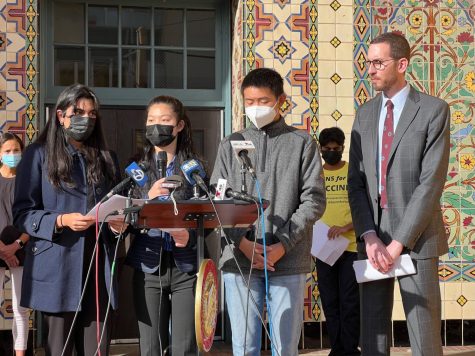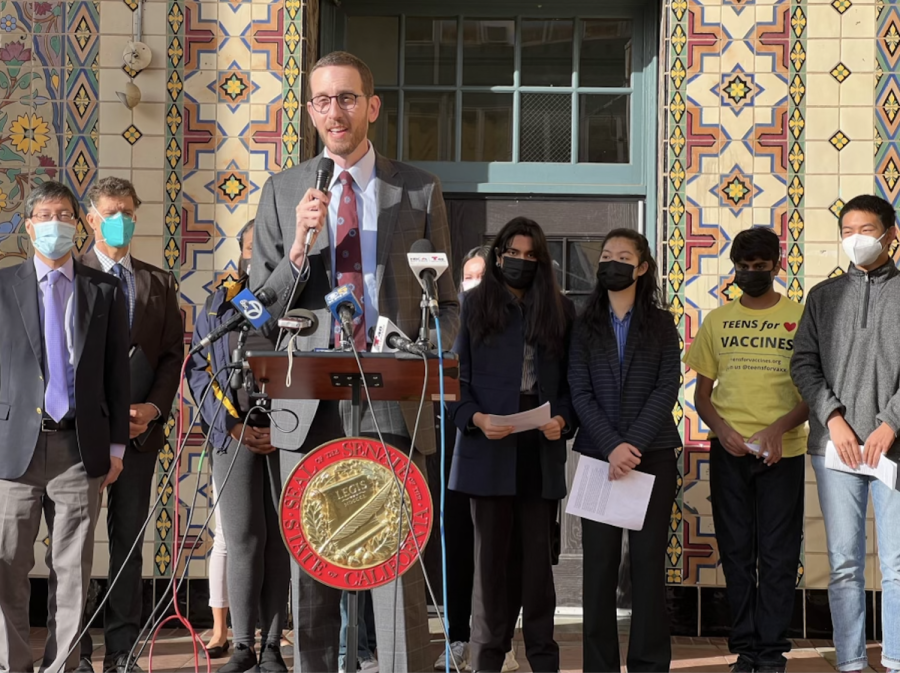State legislation proposed to expand vaccination age of consent
Provided by Office of State Senator Dr. Richard Pan
California State Senator Scott Wiener introduces California Senate Bill 866 (SB 866), which would allow individuals 12 years old and older to receive vaccinations without parental approval, on Jan. 21 at a press conference in San Francisco. “I think we have a shot for getting it passed,” Weiner said. “It’s not guaranteed, the California legislative process is very complicated.”
February 7, 2022
California State Senator Scott Wiener (D-CA) introduced California Senate Bill 866 (SB 866), which would allow individuals 12 years old and older to receive vaccinations without parental approval, on Jan. 21 at a press conference in San Francisco.
“This is how we protect our health care system and save lives — by people getting vaccinated and boosted,” Wiener said in an interview after the event. “And we have to empower people to be able to do that.”
Representatives of GENup, a student-led national educational advocacy organization and a co-sponsor of the bill, spoke at the press conference. GENup National Director of Innovation and Strategy Cady Chen (12) and Director of Strategic Partnerships Saanvi Arora (12) both expressed their support for the bill, highlighting the need for vaccine autonomy during the pandemic and the adverse impacts of COVID-19 on education.
“Vaccination autonomy will allow us to seize agency over our own education, our own safety and our own futures,” Cady said during the press conference. “From our peers, we have learned of too many scenarios where current vaccination protocols that require parental consent prevented them from getting vaccinated.”
SB 866, also known as the Teens Choose Vaccines Act, would lower the vaccination age of consent from 18 to 12 years old.
“I do think that 12 [year olds] and older are smart enough to make their own decisions, medically speaking,” Varun Bhupathi (9) said.
In order to become law, SB 866 will need to pass committees and house floor votes in both the California State Senate and the California State Assembly and receive approval from Governor Gavin Newsom.
“I think we have a shot for getting it passed,” Weiner said. “It’s not guaranteed, the California legislative process is very complicated. There are many opportunities for even non-controversial bills to trip up and not pass, so we’re never guaranteed. And obviously there’s controversy around this bill, as there are all vaccine bills.”
Four days after SB 866 was co-introduced by Wiener and California State Senator Richard Pan in the state legislature on Jan. 20, Pan co-introduced SB 871, which would mandate COVID-19 vaccinations for all California students without a personal beliefs exemption if passed. Weiner says that there will be more pro-vaccination bills introduced in the California Senate this year.
“We have the opportunity to build momentum to pass these various bills,” Wiener said.
Cady and Saanvi both worked with Wiener’s office on the planning process of SB 866 and with Pan’s office on SB 871 and are now working on mobilizing students to support the bills.

“We’re really doing everything that we can to make sure we don’t have to go back online, because it causes a severe backsliding in the quality of education across the state,” Saanvi said.
Upper school history and social science teacher Carol Green notes that there is precedent for SB 866. As noted in the bill’s factsheet on Wiener’s website, 12 to 17 year olds can currently receive human papillomavirus and hepatitis B vaccinations and gain access to reproductive health and mental health treatment without parental approval in California. She also recognizes that SB 866 would impact a non-voting population, a factor that California lawmakers may take into consideration when voting on SB 866.
“The only concern that I have with that, when you’re watching the news, and when you’re listening to these different debates about it, then, is that the people who do vote are not the ones that necessarily directly impacts,” Green said. “If there’s a lot of parents who voice concern, then it’ll be up to these elected officials to do what is in the interest of the community at large.”
Additional reporting by Arely Sun.


















![“[Building nerf blasters] became this outlet of creativity for me that hasn't been matched by anything else. The process [of] making a build complete to your desire is such a painstakingly difficult process, but I've had to learn from [the skills needed from] soldering to proper painting. There's so many different options for everything, if you think about it, it exists. The best part is [that] if it doesn't exist, you can build it yourself," Ishaan Parate said.](https://harkeraquila.com/wp-content/uploads/2022/08/DSC_8149-900x604.jpg)




![“When I came into high school, I was ready to be a follower. But DECA was a game changer for me. It helped me overcome my fear of public speaking, and it's played such a major role in who I've become today. To be able to successfully lead a chapter of 150 students, an officer team and be one of the upperclassmen I once really admired is something I'm [really] proud of,” Anvitha Tummala ('21) said.](https://harkeraquila.com/wp-content/uploads/2021/07/Screen-Shot-2021-07-25-at-9.50.05-AM-900x594.png)







![“I think getting up in the morning and having a sense of purpose [is exciting]. I think without a certain amount of drive, life is kind of obsolete and mundane, and I think having that every single day is what makes each day unique and kind of makes life exciting,” Neymika Jain (12) said.](https://harkeraquila.com/wp-content/uploads/2017/06/Screen-Shot-2017-06-03-at-4.54.16-PM.png)








![“My slogan is ‘slow feet, don’t eat, and I’m hungry.’ You need to run fast to get where you are–you aren't going to get those championships if you aren't fast,” Angel Cervantes (12) said. “I want to do well in school on my tests and in track and win championships for my team. I live by that, [and] I can do that anywhere: in the classroom or on the field.”](https://harkeraquila.com/wp-content/uploads/2018/06/DSC5146-900x601.jpg)
![“[Volleyball has] taught me how to fall correctly, and another thing it taught is that you don’t have to be the best at something to be good at it. If you just hit the ball in a smart way, then it still scores points and you’re good at it. You could be a background player and still make a much bigger impact on the team than you would think,” Anya Gert (’20) said.](https://harkeraquila.com/wp-content/uploads/2020/06/AnnaGert_JinTuan_HoHPhotoEdited-600x900.jpeg)

![“I'm not nearly there yet, but [my confidence has] definitely been getting better since I was pretty shy and timid coming into Harker my freshman year. I know that there's a lot of people that are really confident in what they do, and I really admire them. Everyone's so driven and that has really pushed me to kind of try to find my own place in high school and be more confident,” Alyssa Huang (’20) said.](https://harkeraquila.com/wp-content/uploads/2020/06/AlyssaHuang_EmilyChen_HoHPhoto-900x749.jpeg)











